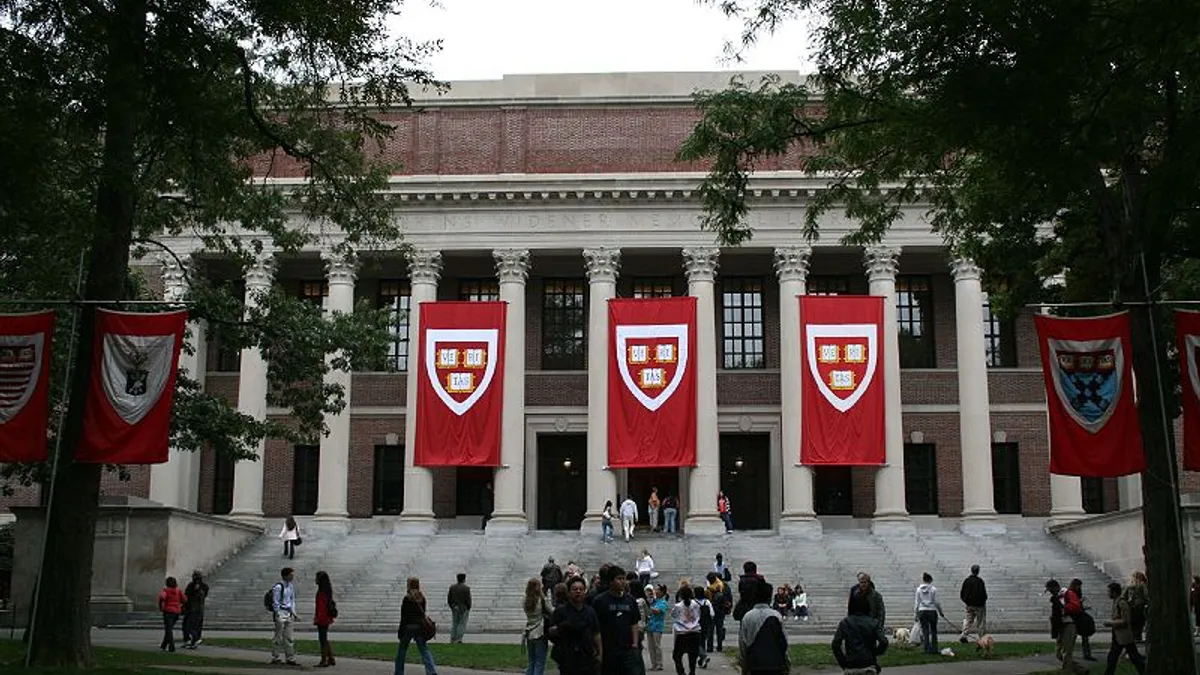Dive Brief:
-
Harvard University CFO Thomas J. Hollister said Monday that, despite the school's $40.9 billion endowment and receiving nearly $9 million in aid via the CARES Act, the school must still focus its funds on teaching and research, eschewing all non-essential spending.
-
"The philosophy so far on spending is to stop — apply the tourniquet — and make sure we’re not spending anything for expansion or for discretionary reasons," Hollister told student newspaper The Crimson.
-
In recent weeks, Harvard has faced a shrinking endowment and dwindling sources of revenue, which, despite ample resources, Hollister called challenging.
Dive Insight:
Last month, Congress passed a $2.2 trillion stimulus package meant to slow coronavirus-related economic turmoil. Of the roughly $14 billion set aside for higher education, lawmakers dedicated nearly $6.3 billion to colleges, sister publication Education Dive reported.
A few weeks later, in an email to school affiliates, Harvard University President Lawrence Bacow, Executive Vice President Katherine Lapp, and University Provost Alan Garber announced the university would institute an immediate salary and hiring freeze, canceling or deferring discretionary spending, and potentially deferring capital projects.
Two days after Bacow’s email, the Department of Education announced Harvard would receive nearly $9 million in aid through the Coronavirus Aid, Relief, and Economic Security Act. The CARES Act makes funds available to universities based on their share of Pell Grant recipients and overall enrollment.
Hollister’s key focus is making sure the university is spending "whatever's necessary" to uphold their mission. "Any nice things should be either stopped or deferred," he said. Among these "nice things," he told the Crimson, are grants and “hiring consultants to study something." Capital spending projects, including campus building renovations, are postponed.
"As nice as it would be to continue with capital improvements, that’s something that can be deferred," Hollister said.
He referenced unfinished renovation work on a student building, Adams House, saying construction "is likely to be restarted and finished" once Cambridge lifts its construction ban on construction. But other dorms with plans to be renovated may have to wait.
"Much more likely to be cut is projects that have not yet begun," he said. "The Faculty of Arts and Sciences needs to assess whether Adams House, for example — once the current building is finished — whether it’s wiser or not to continue to the next phase."
Hollister declined to approximate a timeframe for decisions on cuts to capital spending, citing the "high degree of uncertainty" in the University’s plans for the fall, The Crimson reported.
"I think there’s a high degree of uncertainty affecting many activities, frankly, across the world. And this includes businesses, and colleges and universities. Harvard is in — and we’re not alone in this — not knowing what our operating environment will be in the fall, because there’s a great deal of uncertainty," Hollister said.
On April 8, Moody’s Investor Service reported Harvard would be selling $1.1 billion in bonds, using the proceeds to refinance outstanding debt. The ratings company said Harvard will also sell $500 million in taxable bonds for "eligible corporate purposes."
The same week, Faculty of Arts and Sciences Dean Claudine Gay announced, in an email to faculty and students, the department had lost $30 million "in unforeseen expenses and lost revenue" due to the pandemic, leaving it unable to cover its yearly budget.
Regardless of the situation, Hollister told The Crimson, administrators aim to minimize the impact spending cuts will have on Harvard’s faculty, staff and students.
"Whatever Harvard is, it’s because of its talented faculty and staff and promising students," he said. "As we examine the different scenarios for the fall, in terms of cuts, the priority will be on non-people."
The government mandates that half of Harvard’s incoming $8,655,748 check must be set aside for student financial aid grants. Beyond that, Harvard can allocate its funds at its own discretion, The Crimson reported.
Unlike some schools, including Vanderbilt University, which has pledged to use its $2.8 million aid package to support students with “demonstrated need[s] and significant financial challenges due to the ongoing COVID-19 pandemic,” Harvard has not revealed how it intends to allocate its funds.














